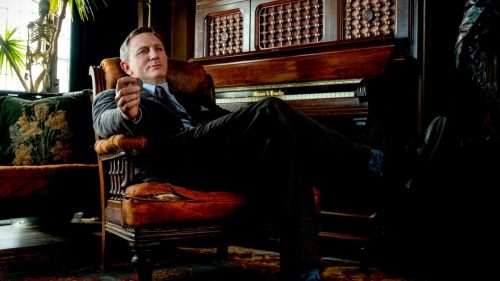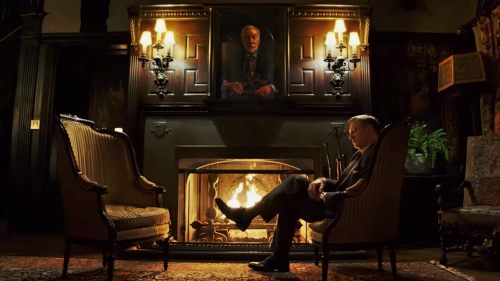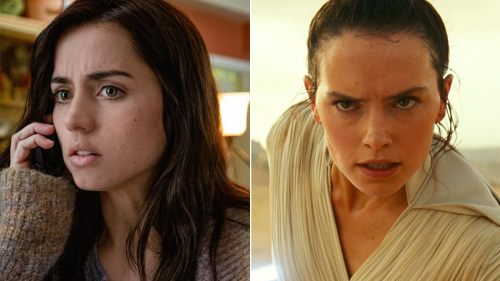Rian Johnson’s Many Detectives
FAIR WARNING: This will be a spoiler-free piece for Knives Out, but there may be spoilers for Brick, The Brothers Bloom, Looper and The Last Jedi.
I’m going to start this off by speaking personally. Rian Johnson is my favorite filmmaker working today. From his knack for idiosyncratic dialogue to his use of camera motion to convey emotion, his filmmaking is a joy to take in. Each of his five films has clicked quite strongly with me. One of them, his downbeat, sunny conman tale The Brothers Bloom may just be my very favorite movie. His latest, the bitingly funny murder mystery/psychological thriller Knives Out, hits theaters this week. I’m thrilled for folks to see it. In the meantime, I’ll use it as a springboard for a reading of Johnson’s work that I’ve developed. As I have come to see it, every one of his protagonists is a detective. There are two cases where this is literally true – Joseph Gordon-Levitt’s hard-edged teen sleuth Brendan in Brick and Daniel Craig’s gentlemanly private eye Benoit Blanc in Knives Out. But setting aside what their business cards may specifically say, it is their separation from the mainstream, their drive to seek truth and their relationship with the worlds they live in that mark Johnson’s protagonists as gumshoes.
In the last paragraph of his seminal essay “The Simple Art of Murder,” the great mystery novelist Raymond Chandler describes the detective. This essay will be our keystone. Chandler describes the detective as, amongst other things “a lonely man.” By intent or circumstance, Johnson’s protagonists are all isolated to some extent. Brick’s Brendan goes out of his way to avoid his fellow students – so much so that the closest person he has to a friend hasn’t seen him in months. The Brothers Bloom’s disenchanted con artist Bloom (Adrien Brody) is ill at ease in the grifting community, and his introduction in the film as an adult is capped off by an attempt to leave his life-loving brother Stephen (Mark Ruffalo) behind for a busy life of drinking himself into oblivion. As a young man Looper’s Joe (Gordon-Levitt) is focused more on securing his future than on partying with his fellow assassins – enough so that even his relationship with his best friend (Paul Dano) is ultimately conditional and transactional. As an old man (Bruce Willis), Joe is literally out of place and out of time, with no one to turn to or confide in but himself. The Last Jedi’s Rey (Daisy Ridley) grapples with her long-held belief that she is a “nobody” from “nowhere.” Her awakening to her immense strength in the Force complicates this, but simultaneously throws her identity and place in the world further into question. Knives Out’s Blanc is one of the very few players to not belong to the Thrombey family, and where they’re a variety pack of venal schmucks, Blanc is without fail polite and thoughtful. Ana de Armas’ Marta, the nurse of murder victim Harlan Thrombey (Christopher Plummer) and Blanc’s Watson, is similarly at a remove – albeit for reasons best discussed after Knives Out’s release.
The separation Johnson’s protagonists feel from the world is joined by relentless drives to question and seek the truth. As Chandler puts it, “The story is his (the detective’s) adventure in search of a hidden truth, and it would be no adventure if it did not happen to a man fit for adventure.” These drives are both key to understanding his protagonists and form the narrative engine for each of Johnson’s films. Brick’s Brendan needs to know who murdered his ex-girlfriend Emily (Emilie de Ravin) and who set her up to be murdered. The Brothers Bloom’s Bloom wants to know who he is underneath the lies he has told for his entire life. Looper’s Old Joe hunts for the true identity of the all-powerful crime lord known only as “the Rainmaker.” His younger self ultimately comes to question whether the life he has been fighting so hard to get back is in fact the life he wants. The Last Jedi’s Rey aims to understand what happened to galactic hero turned bitter exile Luke Skywalker (Mark Hamill) and the Jedi he had once hoped to see reborn. Once she knows, Rey’s focus shifts towards pulling her enemy-turned-peer Kylo Ren/Ben Solo (Adam Driver) back to the side of good. When that goes sideways, Rey’s driving question grows to become “how can she do the most good?” In Knives Out, Blanc aims to uncover who killed Harlan, while Marta ultimately finds herself asking “is there more going on here than what I know?”
Returning one last time to “The Simple Art of Murder,” Chandler writes that “He (the detective) has a range of awareness that startles you, but it belongs to him by right, because belongs to the world he lives in.” Being out of sync with the world is far from the same thing as being disconnected from it. Johnson’s protagonists pay attention. They catch details that others miss, recognize subterfuge for what it is, put the pieces together. It’s Brendan recognizing a pale blue arrow on a cigarette and making a point to ask a killer if he smokes in Brick. It’s Bloom remembering something his brother said to him off-hand, a clue that completely re-orients his understanding of The Brothers Bloom’s last act. It’s Joe seeing the moment that sets time on a “bad path… a circle, round and round” in Looper. In The Last Jedi it’s Rey realizing that, even as she connected to the Force and felt all of life on the island of Ach-To, Luke was nowhere to be found. And as for Knives Out, well, let’s just say that Benoit Blanc catches on to a great deal that the assorted Thrombeys would never have even realized was there.
I love good detective stories. Their winding trails towards truth, the attention they pay to the world and the seekers who drive them forward. Be they PIs, conmen, assassins or Jedi, Rian Johnson’s protagonists stand proudly amongst the best out there.



